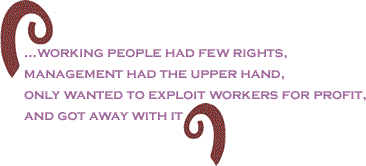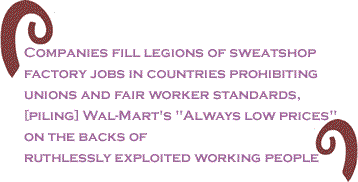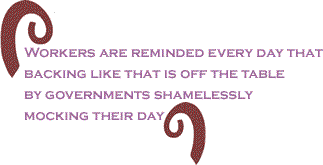
|
|||||||||||||||||||||
|
||||||||||
|
||||||||||
 |
||||||||||
 |
||||||||||
Labor Day has been commemorated
on the first Monday in September each year, since the first
one was celebrated in Labor Day became a national
federal holiday when Congress passed legislation for it in
June, 1894, at a time when working people had few rights, management
had the upper hand, only wanted to exploit workers for profit,
and got away with it. It took many painful years of organizing,
taking to the streets, going on strike, holding boycotts, battling
police and National Guard forces, and paying with blood and
lives before real gains were won. Workers got an eight-hour
day, a living wage, on-the-job benefits and the pinnacle of
labor's triumph in the 1930s, with the passage of the landmark
Wagner Act, establishing the National Labor Relations Board
(NLRB). It guaranteed labor the right to bargain collectively
on equal terms with management, for the first time ever. All of it was won [by action
at] the grass-roots level. Management gave nothing until forced
to, and neither did government. It always sides with business,
never yielding a thing unless threatened with disruptive work
stoppages or possible insurrection. All this is in a democracy
that claims to be a government of the people, by the people
and for the people - most of whom are ordinary working-class
ones. Since a worried Congress passed
the 1935 Wagner Act during the Great Depression, the state
of organized labor declined, especially post-WW II. The decline
accelerated precipitously during the Reagan years under an
administration openly hostile to worker rights in its one-sided
support for management. It continued unabated under Republican
and Democratic administrations, and today stands at a multi-generational
low.
Under George Bush, conditions
got much worse. Since coming into office in 2001, he openly
sided with management on policies to strip workers of their
right to organize and bargain for a living wage and essential
benefits. He hired anti-union officials, denied millions overtime
pay, cut pay raises for 1.8 million federal workers - claiming
a "national emergency" - and schemed to end Social
Security as we know it by plotting (unsuccessfully so far)
to let Wall Street sharks take it over. Since labor's ascendancy decades
earlier, corporate Even worse, most jobs are
low-pay service sector positions because the nation's manufacturing
base and many higher-paying jobs in finance and technology
have been sent offshore to low-wage, developing nations. Workers
there can be hired for a fraction of the pay scales here, or
as virtual serfs at below-poverty wages as low as $2 a day
or less and with no benefits. Companies fill legions of sweatshop
factory jobs in countries prohibiting unions and fair worker
standards, [piling] Wal-Mart's "Always low prices" on
the backs of ruthlessly exploited working people.
Nonetheless, on the first
Monday each September, this nation "remembers" working
Americans with a federally mandated holiday in their "honor." Who's
celebrating, when it's disingenuously commemorated at a time
when worker rights are threatened, ignored, forgotten and uncared
about by heartless governments beholden to capital. They scorn
working people who are no longer as deceived with meaningless
bread and circus droppings at the expense of what they need
most: good jobs at good pay, essential benefits, job security
and a government on their side, doing what counts most - supporting
their rights with worker-friendly legislation. Workers are reminded every
day that backing like that is off the table by governments
shamelessly mocking their day. It's commemorated in name only
by a nation beholden to capital, the corporate giants controlling
it, and the best democracy their money can buy for them, alone. This article was originally
published as a Truthout editorial. Stephen Lendman lives in |
||||||||||
| September
6, 2007 Issue 243 |
|
| Printer Friendly Version in resizeable plain text format format |
 |
 |
 |
| |
| |
































